|
|
|
Sort Order |
|
|
|
Items / Page
|
|
|
|
|
|
|
| Srl | Item |
| 1 |
ID:
106811
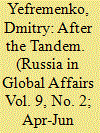

|
|
|
| 2 |
ID:
151550
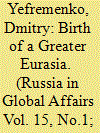

|
|
|
|
|
| Summary/Abstract |
Nearly twenty-five years separate two symbolic coincidences, each of which caused tectonic shifts in world politics. On December 8, 1991, a treaty signed in Belovezhye, Belarus, put an end to the Soviet Union; the following day the leaders of twelve Western European countries approved the Maastricht Treaty. On June 23, 2016, a majority of voters in the United Kingdom chose to leave the European Union. Around the same time India and Pakistan signed memorandums in Tashkent, Uzbekistan, to join the conventions of the Shanghai Cooperation Organization, thus bringing its membership to almost a half of the world's population.
|
|
|
|
|
|
|
|
|
|
|
|
|
|
|
|
| 3 |
ID:
157240
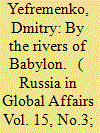

|
|
|
|
|
| Summary/Abstract |
More than a century has passed since Britain, France, and Russia arbitrarily divided the vast territories of the Ottoman Empire into areas of their own post-war dominance. The Sykes-Picot Agreement started the process of partitioning the Middle East into countries that cut through regions historically populated by Arabs and Turks, Kurds and Assyrians, Sunnis and Shiites, Christians and Jews, etc. Subsequently, the borders of those countries changed many times, but the great powers remained consistently involved in the process. And yet, although the borders were largely artificial and the risk of conflict was quite high, the Middle Eastern order held for almost a century (assuming the 1920 Treaty of Sevres is the starting point), and some countries in the region developed quite successfully. But the quality of governance and functionality of the State were never high, and the ability to resist centrifugal tendencies was often ensured by harsh—and sometimes downright repressive—regimes. But the U.S. intervention in Iraq to remove Saddam Hussein and the subsequent Arab Spring created such turbulence that the Middle Eastern order started to crumble, putting Iraq, Syria, Libya, and Yemen on the brink of disintegration.
|
|
|
|
|
|
|
|
|
|
|
|
|
|
|
|
| 4 |
ID:
161033
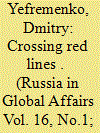

|
|
|
|
|
| Summary/Abstract |
Minor causes may have major consequences. A hundred years ago a terrorist act masterminded by a small group of Serbian nationalists set in motion a chain reaction that eventually led to a world war and the collapse of several empires. In our days, a short Facebook message calling on likeminded people to gather in Kiev’s central square led to a crisis that shook Europe and dramatically expedited changes in the existing world order. The Ukrainian crisis is at its apex and is likely to cause much more trouble
|
|
|
|
|
|
|
|
|
|
|
|
|
|
|
|
| 5 |
ID:
134546
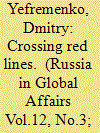

|
|
|
|
|
| Summary/Abstract |
The Ukrainian crisis is just ushering in a series of conflicts amid which a polycentric system of international relations will form. An effective multilateral mechanism must be created for preventing and settling crises in Europe and North Eurasia.
|
|
|
|
|
|
|
|
|
|
|
|
|
|
|
|
| 6 |
ID:
100599
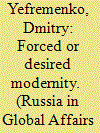

|
|
|
| 7 |
ID:
127047
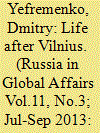

|
|
|
|
|
| Publication |
2013.
|
| Summary/Abstract |
This article presents some of the results of a project conducted as part of a Russian Academy of Sciences program: "Perspectives of Coordinated Social and Economic Development of Russia and Ukraine in the Pan-European Context."
A political anniversary passed largely unnoticed on 12 September 2013: fifty years ago on that date Turkey and the European Economic Community signed an association agreement. Although it might be a good time to look back on what has been achieved since then and make plans for the future, Turkish politicians have largely ignored the anniversary. And for good reason! While the association agreement resulted in tangible economic benefits for Turkey, in the political sense it doomed that ambitious country to 50 years of humiliating uncertainty in the antechamber of a unifying Europe. Today Ukraine, another large country, is impatiently waiting to be let into that antechamber. But no political analyst in his right mind will state that Ukraine will not have to wait longer than Turkey for full-fledged European Union membership.
|
|
|
|
|
|
|
|
|
|
|
|
|
|
|
|
| 8 |
ID:
158200
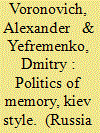

|
|
|
|
|
| Summary/Abstract |
French philosopher and historian of religion Ernest Renan in his speech at the Sorbonne in 1882 defined a nation as follows: "A nation is a soul, a spiritual principle. Two things which, properly speaking, are really one and the same constitute this soul, this spiritual principle. One is the past, the other is the present. One is the possession in common of a rich legacy of memories; the other is present consent, the desire to live together, the desire to continue to invest in the heritage that we have jointly received."
|
|
|
|
|
|
|
|
|
|
|
|
|
|
|
|
|
|
|
|
|